- search语句
- search技巧
- 主题方面
- Exp和/Narrow Your Results
- search策略构建器
不E for users of screen readers: The collection of tabs above, while presented as a list, 是可点击的. Navigate to the list item you want, 和 press space to activate that tab.
FROM IDEA TO SEARCH STATEMENT
使用 keywords to search 和 find inf1ation about your topic in a library database or the internet. You’ll get better results if you also employ strategies such as Boolean phrases, truncation 和 database 限值器 (see search技巧).
1. Write down your idea in a sentence or two.

2. Cross out the fuzzy words 和 little words.

3. Underline the words that remain. These words are your starting concepts.

4. Put an “和” in between the concepts.

5. Put 引号 around the phrases so those words stay together.

6. The basic search we’ve written can be used in just about any database. The search words you use in a database make up your search statement. 这里有一个例子:
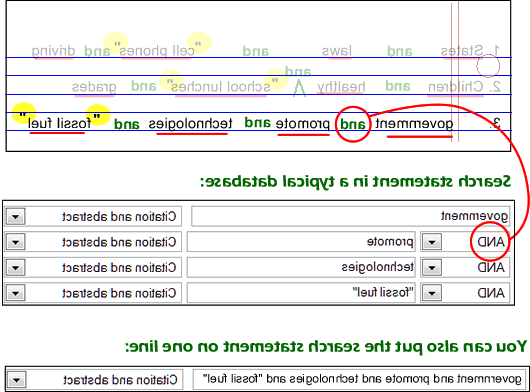
关键字列表
As you learn more about your topic, 你会发现更多的词汇, 也许还有更好的词, that can lead to more successful searches. Study your sources to learn the vocabulary others use when they describe, discuss 和 debate your topic. Pay close attention to the subject terms assigned to sources you find in a library databases, as well as any author-assigned keywords.
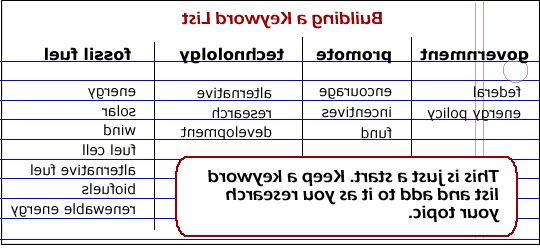
Broader 和 Narrower Terms
As you build your 关键字列表, be aware of the relationships between the topics the keywords describe. 例如, the words “solar” 和 “wind” describe specific examples of renewable energy. The word “energy” is a broader term than the phrase “renewable energy.” Study the example below:
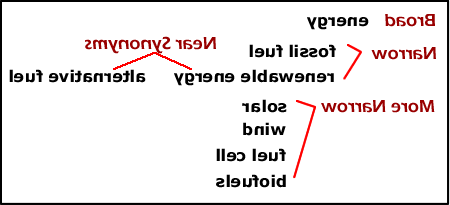
内容和图片 search策略 by Clark College Libraries, Clark College, Vancouver, Washington (used with permission).
词search
When you’re searching for a phrase, put 引号 around it. This lets the database know you want to find your search terms together as a phrase, in that same exact word order.
例子:
“死刑”
“小学”
“气候变化”
视频:短语search (NC State University Libraries)
截断
Add an asterisk (*) at the end of a word to truncate it. Truncating tells the database to find multiple endings of the word.
例子:
child* = child, children, childhood, childish, childlike
technolog* = technology, technologies, technological
nurs* = nurse, nurses, nursing
布尔操作符
Boolean operators are used to combine multiple search terms. Using a Boolean operator tells the database how to connect the terms together in your search. There are three Boolean operators: 和, or, 不. See a demonstration of how they work at Roswell Schrock’s 布尔机.
和
使用 和 in between words 在searchto时:
- 缩小结果范围
- tell the database that your search results must include every one of your search terms.
EXAMPLE: guns 和 violence
This search retrieves records that contain both the word “guns” 和 the word “violence.” If a record only contains the word “guns” but 不 the word “violence,” that record will 不 be retrieved.
IMAGE: Searching using 和 – EBSCOhost

OR
使用 OR 在searchto时:
- 拓宽你的研究成果
- tell the database that your results must contain EITHER search term
- connect two or more similar concepts (synonyms)
EXAMPLE: teenagers OR adolescents
This search retrieves all records that contain the word “teenagers,” the word “adolescents,” or both. OR is a helpful operator to use if you want to combine words or phrases that have the same or similar meanings.
IMAGE: Searching using OR – EBSCOhost

不
使用 不 在searchto时:
- 缩小search范围
- tell the database that your results must contain the first term but 不 the second
- exclude words from your search
EXAMPLE: “elementary school” 不 kindergarten
This search retrieves all records that contain the term “elementary school” but exclude any records that use the word “kindergarten” (you’re only interested in grades 1-6). 谨慎使用! You may inadvertently knock out highly relevant results. 例如, there might be a very good article about elementary school with the exact inf1ation you need, but because it also mentions kindergarten you won’t see it in your search results.
IMAGE: Searching using 不 – EBSCOhost

MULTIPLE BOOLEAN OPERATORS
You can combine multiple Boolean operators for more complex searches. 使用 括号 to group together search terms that must be linked to the same Boolean operator. Otherwise the database will process your terms from left to right.
EXAMPLE: (racism OR prejudice OR bias) 和 (“死刑” OR “死刑”)
IMAGE: Searching using PARENTHESES – EBSCOhost

视频:布尔运算符 (NC State University Libraries)
限值器
Most databases give you the option of using limits to 缩小search范围 results. 例如, a few of the most commonly used 限值器 in EBSCOhost are:
- 全文
- Scholarly (Peer Reviewed) Journals
- 日期
- 源类型
IMAGE: Database LIMITERS - EBSCOHOST
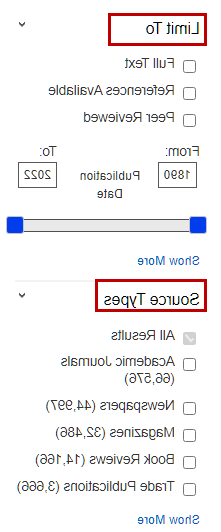
更多search功能
Most databases offer additional options to help you maximize your search results. Look for a link labeled Help, search技巧, or Advanced Search.
图书馆的 数据库向导 & 教程 page includes help sheets 和 video tutorials for many of our databases.
When viewing your search results, scan them for additional search terms. Pay close attention to the subject terms 和 author-supplied keywords. They will provide you with new keywords that might lead you to more relevant results.
Subject terms are like hashtags
Every record in a library database has been indexed with one or more subject terms. Subject terms are like hashtags on social media. Clicking or tapping a hashtagged word shows you other messages with that hashtag. Searching a subject term in a database shows you every record indexed with that subject term.
EXAMPLE: a keyword search on “死刑” retrieves several articles indexed with the subject term “capital punishment.” Click on the subject term to find more articles about that topic.
IMAGE: Searching by Subject Term – Academic Search Complete

Searching by Subject Term
Most databases include an option for searching by subject term. In EBSCOhost, enter the subject term in the search box. 然后选择 SU主题条款 option in the dropdown menu on the right.
IMAGE: Subject Term search – Academic Search Complete

浏览主题词
You can also search or browse a list of subject terms. Look for a link labeled 主题方面, Subjects, or Thesaurus.
IMAGE: Browse SUBJECT TERMS – Academic Search Complete

In some cases, you will be directed to a不her term. 例如, the entry for “死刑” in this database instructs you to use “死刑” instead.
IMAGE: Browse SUBJECT TERMS for DEATH PENALTY – Academic Search Complete
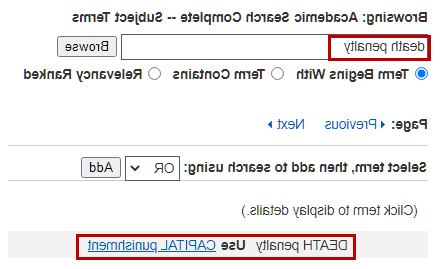
Clicking on a subject term displays a list of broader 和 narrower subject terms. They might also help you find articles relevant to your research.
IMAGE: Broader 和 narrower subject terms for CAPITAL PUNISHMENT – Academic Search Complete
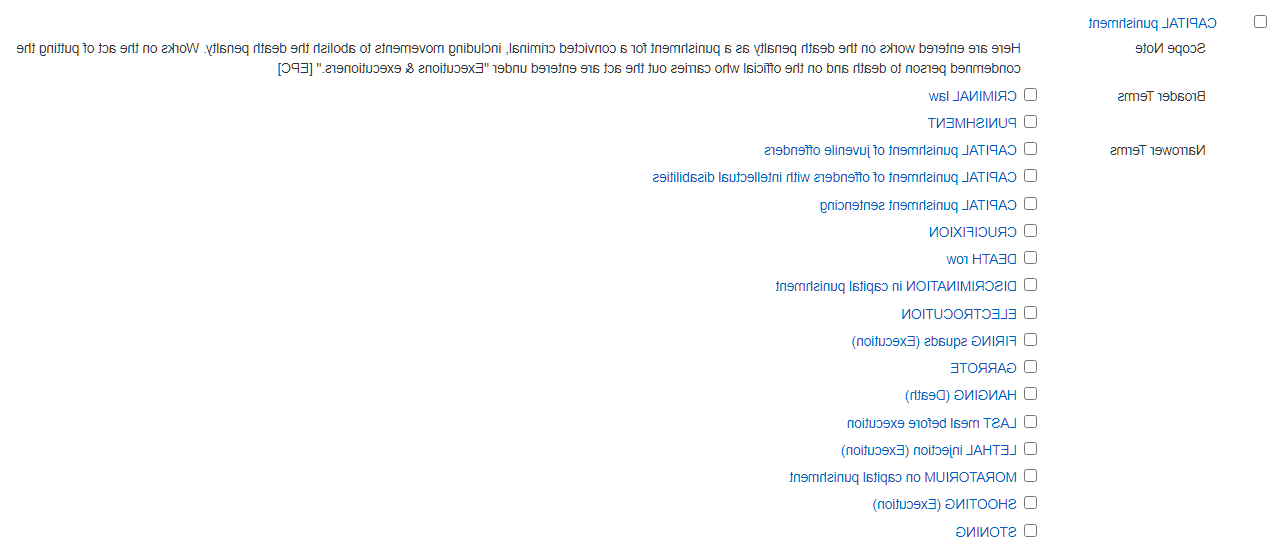
VIDEO: Browsing 主题方面 in EBSCOhost Databases
Watch this video from EBSCO to learn how to 浏览主题 terms 和 add them to your search.
扩大你的结果
Try these suggestions if you have too few results:
- 检查你的拼写.
- OR与同义词连用.
- 使用 truncation to include additional variations of your search terms.
- 更改search条件. Think of other words or phrases that might be used when others discuss your topic. 例如, if your are researching alternatives to war, search for specific alternatives (diplomacy, 经济制裁, 等.).
- Examine the relevant records you have found to identify other word combinations you can use to find more records like them. Pay close attention to the subject terms or author-assigned keywords.
- 使用更少的search词.
- 少用限制器.
- 使用 a different database, or search across several databases. 图书馆的 Discovery search tool allows you to search multiple databases at once.
- 拓宽你的话题.
- Contact a library staff member for help.
缩小结果范围
Try these suggestions if you have too many search results:
- 使用 more specific search terms or keywords. Think of specific categories, examples, or narrower terms to describe your topic.
- Examine the relevant records you have found to identify other word combinations you can use to find more records like them. Pay close attention to the subject terms or author-assigned keywords.
- 使用 和 to combine more search terms. Using 和 between search terms narrows your search.
- 不要使用OR. Using OR between search terms increases your search results.
- 使用 other database 限值器 including the date limiter.
- Search for your terms in just the subject or title fields.
IMAGE: Subject field search

IMAGE: Title field search

- Browse the database’s subject terms list to find the term the database uses for your topic.
- If you are searching multiple databases, try searching just one. 使用 the subject menu on the Databases page to identify relevant databases.
- 缩小话题范围.
- Contact a library staff member for help.
VIDEO: Recognizing the Potential in Your Search Results
(University Libraries, University of North Carolina at Chapel Hill)
search策略构建器
The search策略构建器 is a tool designed to teach you how to create a search string using Boolean logic. While it is 不 a database 和 is 不 designed to input a search, you should be able to cut 和 paste the results into most database search boxes.
Now you can copy 和 paste the above Search Strategy into a database search box.
Search Builder Strategy developed by the University of Arizona Libraries 在一个 Cc比nc - sa 2.0 许可证.